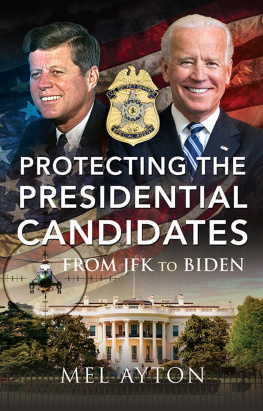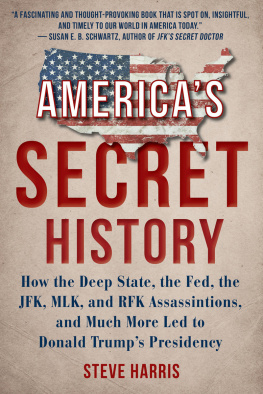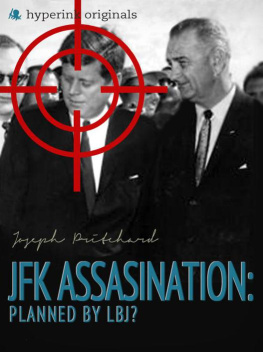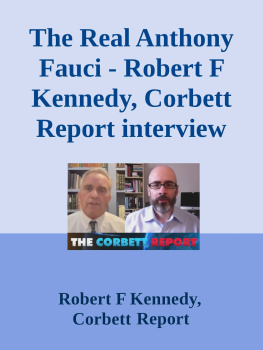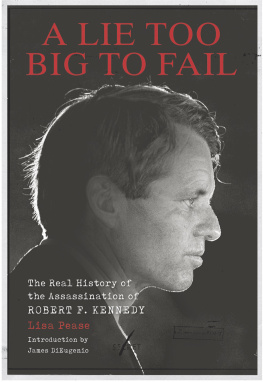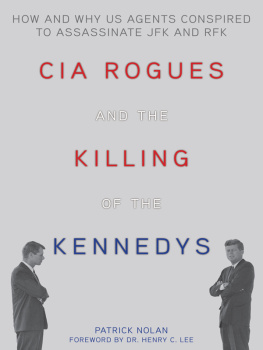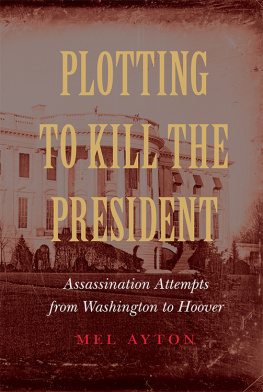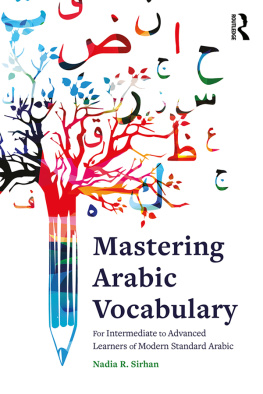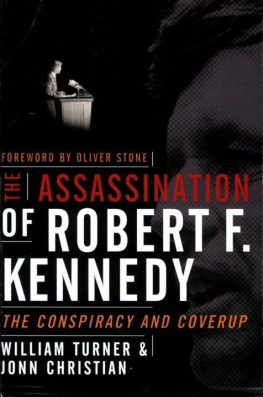Mel Ayton [is] a writer Ive found to be a valuable debunker of unwarranted conspiracy theorizing. He reminds us with copious quotations in [his articles] how repeatedly and explicitly Sirhan made clear why he targeted R.F.K.: because Sirhan hated the state of Israel and hated R.F.K.s support for Israel.
Ron Rosenbaum, The Observer
Important and extensively documented . The chapter on The Unaffiliated Terrorist is especially pertinent to understanding current lone wolf terrorists, as it discusses leading forensic psychology theories to explain Sirhans possible mental state and motivations.
Joshua Sinai, Perspectives on Terrorism
I am a recognized expert on the 1968 murder of Senator Robert Kennedy. Thus, I say with considerable authority that the exquisite detail contained in Mel Aytons well-written, wonderfully researched work makes it must-reading for anyone interested in this case. Step by step, Ayton demolishes the false claims by conspiracy theorists who allege that Sirhan Sirhan was a hypnotically controlled assassin, programmed to kill and programmed to forget about it. Using his encyclopedic knowledge of the assassination investigations, Ayton reveals how the confessed-and-convicted assassins defenders managed to persuade a large portion of the American public into believing that a second gunman was responsible for the senators death. Nobody knows more about the issues revolving around the RFK murder case than Mel Ayton. Nobody.
Dan E. Moldea, author of The Killing of Robert F. Kennedy: An Investigation of Motive, Means, and Opportunity
Students will find this an intriguing story to read, and in an advanced level of seminar devoted to analyzing the use of evidence, very instructive. Ayton is an excellent writer, and his text bristles and probes, leading the reader on a fascinating, if ultimately depressing journey detailing the assassins many obsessions and final fatal decision to silence Sen. Kennedy during the deeply troubled 1968 presidential election season . Mel Ayton presents a compelling examination of the convicted assassins motivations, his state of mind, and the mountain of evidence used to denounce and imprison him.
Craig Hendricks, History Teacher
Mel Ayton, the author of this easy-to-read, information-packed study has produced a significant book with original and detailed information and analyses regarding Sirhans life, motivation, and psychology . Those who despair of the country ever freeing itself from the debilitating morass of the conspiracy mind-set should take heart. It is books like this splendid one that will hasten the day.
Patricia Lambert, author of False Witness: The Real Story of Jim Garrisons Investigation and Oliver Stones Film
Mel Ayton has a well-deserved reputation for doing the near-impossible: writing about controversial history (including conspiracy theories) in a sober but imaginative way, combining reliable accounts with intellectually stimulating arguments. I highly recommend his work.
Rick Shenkman, publisher, History News Network
The Forgotten Terrorist is superlative, especially in regard to Sirhans political obsessions and background. The greatest riddle in any of these high-profile assassinations is motive. Thanks to Mel Ayton, the RFK killing can now be removed from that list of mysteries. I now recommend this book as the first and last book to read on the case.
Gus Russo, author of The Outfit and Supermob
Mel Ayton has accomplished something that no one writing about the RFK assassination has ever achieved before. By combining a judicious review of the forensic and eyewitness evidence with a firm grasp of the historical context, Ayton has finally made sense of the 1968 killing. The Forgotten Terrorist is a long overdue reminder that assassination is political murder.
Max Holland, author of The Kennedy Assassination Tapes
2007 by Potomac Books, Inc.
Foreword 2012 by Alan Dershowitz
Afterword to the second edition 2019 by the Board of Regents of the University of Nebraska
All rights reserved. Potomac Books is an imprint of the University of Nebraska Press.
Manufactured in the United States of America.
Library of Congress Control Number: 2019931615
The publisher does not have any control over and does not assume any responsibility for author or third-party websites or their content.
FOREWORD
T he 1968 assassination of Senator Robert Kennedy by Sirhan may well be one of the most transforming events of the last third of the twentieth century. No one can know for certain what might have been if Bobby Kennedy were to have been elected president. Would he have ended the Vietnam War? Would he have moved our nation toward greater equality? Would he have settled the Israeli-Arab conflict?
It is this last issue that may have cost Kennedy his life, and our nation and the world a great leader. The man who planned and executed his assassination was, according to the author of this volume, obsessed with Israel, with Jews, and with Bobby Kennedys support for the Jewish state. It is the thesis of this book that Sirhan was a Palestinian terrorist who was inspired in his heinous act by the same sort of ideology that motivated other Palestinian terrorists, both before and after he killed Kennedy. The difference is that Sirhan almost certainly acted alone, whereas most other Palestinian terrorists acted at the direction of Yasser Arafat and other Palestinian leaders.
Mel Ayton, who has written about other political assassinations, documents the elements that contributed to Sirhans hatred of anyone or anything associated positively with Israel or Jews. Sirhan was raised on anti-Semitism. His family, friends, and teachers taught him to hate Jews:
Before Sirhan immigrated to America at age twelve he was schooled in East Jerusalem, which was annexed by Jordan during the 1948 conflict . In the Arab world, including Jordan, educational systems were driven by notions antithetical to the values of tolerance and understanding that are so intently promoted in the West. Hundreds of books published from 1948 in Egypt, Syria, Lebanon, Jordan, and Iraq promoted the liquidation of Israel as not only a political necessity but also a moral imperative. Israel and its people were an evil entity, and it was permissible to destroy them. Arab leaders compiled a curriculum of hatred for their children, and the anti-Israeli and anti-Jewish teachings became a basic element in the study of history in the schools. Arab children were taught that Jews were the ultimate embodiment of evil and should be destroyed. (p. 208)
This hatred persisted when Sirhan came to America. He believed Jews ran his new country, controlled the American media, and were thus responsible for the slanted view of Arabs presented by the American media .[Sirhan] couldnt understand the Americans, that they let the Jews suck the blood of the nation, and keep putting money in the banks. Sirhan confessed he still felt towards the Jews as they [the Jews] felt towards Hitler. Hitler persecuted them and now theyre persecuting me in the same style (pp. 209-10). Sirhan denied being psychotic except when it comes to the Jews (p. 210).


